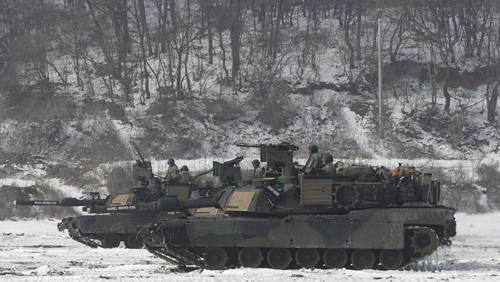DPRK satellite launch leads to calls for sanctions
|
US tanks take part in a military exercise near the demilitarized zone between the ROK and the DPRK, in Paju, ROK, on Thursday. Ahn Young-joon / Associated Press |
A satellite that the Democratic People's Republic of Korea launched aboard a long-range rocket is orbiting normally, the Republic of Korea said on Thursday.
The ROK navy has launched a salvage operation in the Yellow Sea to retrieve the rocket's debris.
Washington and its allies are pushing for punishment over the launch that they say is nothing but a test of banned ballistic-missile technology.
Seoul's Defense Ministry said the satellite launched by the rocket is orbiting normally at a speed of 7.6 km per second, though it's not known what mission it is performing.
DPRK space officials said the satellite will be used to study crops and weather patterns.
ROK Defense Ministry spokesman Kim Min-seok said it usually takes about two weeks to determine whether a satellite works successfully after liftoff, citing data from the North American Aerospace Defense Command, or NORAD.
NORAD also said "initial indications are that the missile deployed an object that appeared to achieve orbit".
In Pyongyang, however, pride over the scientific advancement outweighed the fear of greater international isolation and punishment. Citizens clinked beer mugs and danced in the streets to celebrate.
"It's really good news," Pyongyang resident Jon Il-gwang told The Associated Press as he and scores of other residents poured into the streets after a Wednesday noon announcement to celebrate the launch by dancing in the snow. "It clearly testifies that our country has the capability to enter into space."
In Seoul, about 100 people held a rally to protest the launch, and burned a mock missile made of paper.
The launch was the DPRK's fifth attempt since 1998. An April launch failed in the first of three stages, raising doubts among outside observers whether Pyongyang could fix what was wrong in eight months. But those doubts were erased on Wednesday.
The Unha rocket, Korean for "galaxy", blasted off from a launchpad northwest of Pyongyang just three days after the DPRK indicated that technical problems might delay the launch.
ROK navy ships found what appears to be debris from the first-stage rocket in the Yellow Sea and were trying to retrieve it on Thursday, defense officials said. The debris is believed to be a fuel container from the first rocket stage.
"A salvage operation is now under way to retrieve it," a Defense Ministry spokesman said, adding that Seoul has no plans to return it to Pyongyang because the launch violated UN resolutions.
The chunk of debris was found on the seabed, about 160 km west of the southwestern port of Gunsan, Yonhap news agency said, at a depth of around 80 meters.
Before its previous rocket launch attempt in April - which ended in failure - the DPRK had warned both Japan and the ROK that any effort to salvage debris from the rocket would be considered an "act of war".
But the warning was not repeated before Wednesday's launch.
The launch could leave Pyongyang even more isolated and cut off from much-needed aid and trade.
The UN imposed two rounds of sanctions after nuclear tests in 2006 and 2009, and ordered the DPRK not to conduct any launches using ballistic-missile technology. Pyongyang maintains its right to develop a civilian space program, saying the satellite will send back crucial scientific data.
AP-AFP



















